Health and education set to get biggest share of Stormont budget
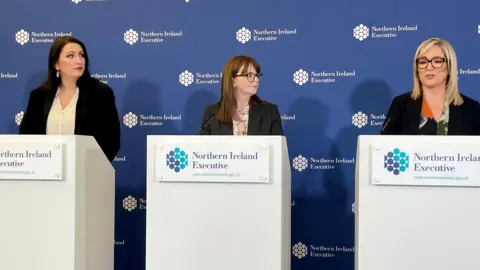 PA
PAThe Northern Ireland Executive has agreed to release for public consultation its draft budget for the 2025/26 financial year.
Under the proposals, the health and education departments would receive most of the £19bn budget allocation.
The spending plan involves around £16bn for day-to-day spending and £2bn for capital spending.
It outlines an increase in spending on the previous financial year, with day-to-day spending set to increase by 9%.
It is also proposing to increase the regional rate, which forms part of the calculation for annual rates bills, by 5% for households and 3% for businesses.
That would be an extra 60p per week for a typical household, according to Stormont officials.
Ministers in Stormont's four-party devolved government met to discuss the plans on Thursday.
How much money will each department get?
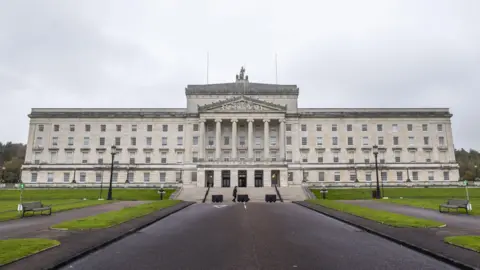 PA Media
PA MediaThe draft budget allocations 2025/26 for each Stormont executive department are as follows:
- Health: £8.79bn
- Education: £3.6bn
- Infrastructure: £1.57bn
- Justice: £1.51bn
- Communities: £1.25bn
- Economy: £1bn
- Agriculture, Environment and Rural Affairs: £716m
- Finance: £271m
- Executive Office: £253m
The figures are made up of both day-to-day spending and money allocated for investment, known as capital spending.
Speaking at a news conference on Thursday, First Minister Michelle O'Neill said funding had been proposed for tackling violence against women and girls.
"This draft budget reflects our programme for government commitments to doing what matters most and to tackle the issues facing working families and communities here," she said.
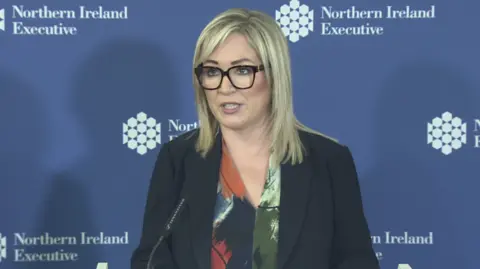
Deputy First Minister Emma Little-Pengelly said the draft budget included a doubling of funding for a childcare strategy to £50m.
She also said the executive had agreed to "ringfence" funding for agriculture, the environment and rural development.
"The fiscal environment still remains challenging, but I do believe we are making a significant difference," Little-Pengelly said.
'Resources where they are needed most'
Finance Minister Caoimhe Archibald highlighted £100m capital funding for housing and more than £105m for Northern Ireland Water and wastewater infrastructure.
She said she hoped it would be the last one-year budget and that the Stormont executive would be able to move towards multi-year budgets in future.
"Collectively we have worked together to allocate resources to where they are needed most, and in line with the executives priorities," she said.
"It supports our commitment to deliver affordable child care, focusses the energy of our economy by investing in skills, and supports our farming community and agriculture industry."
More than half of the day-to-day funding will be allocated to health under the draft budget proposals.
Archibald said the plans would give an 8.3% uplift on the previous year's health budget.
'Very challenging allocation'
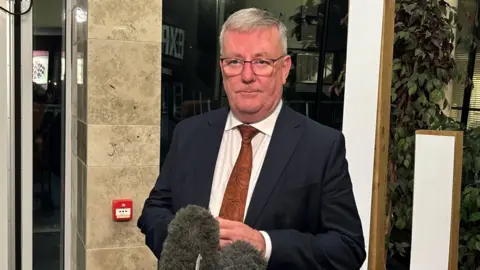 PA
PAHealth Minister Mike Nesbitt said there was "room for improvement" in the executive's draft budget.
He said it was a "very challenging allocation" but he was accepting the challenge.
Speaking after the executive meeting, Nesbitt said: "I think every executive minster is under pressure in terms of their budgets and the finance minister was left with an impossible challenge in terms of meeting what everybody wanted.
"I made no objection to the draft budget going out to consultation, but what I do object to is the disconnect between the budget and the programme for government."
He added: "In the programme for government waiting lists are one of the nine priorities, but if you go to the draft budget, there isn't a single mention of waiting lists and therefore not a single penny for tackling those lists."
 PA
PAThe leader of Stormont's opposition, the SDLP's Matthew O'Toole, dismissed Nesbitt's criticism of the draft budget saying "he isn't detached from this thing".
O'Toole said: "He's in the Executive. He's in charge of producing a plan. We've seen parts of a plan, concepts of a plan but we haven't necessarily seen a full clear multi-year plan for how the health minister was to get waiting lists done.
"He has more power than I do as leader of the opposition to demand that it is delivered and we will be encouraging him to do that."
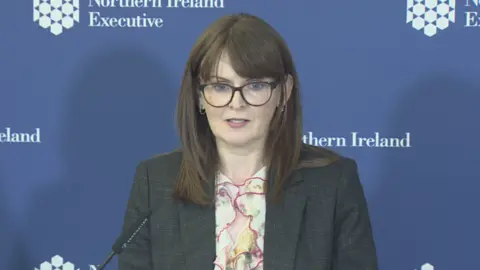
'No money for Lough Neagh'
The Environment Minister, Andrew Muir, said it was a "difficult budget" for him and his department.
Speaking to BBC Radio Ulster's Evening Extra, he said: "This budget does not give me the additional tools I need to be able to address the issues in Lough Neagh.
"We've had two years running of severe issue for blue-green algae and it's likely this will continue for decades."
Muir said he had bid for £51m for day-to-day spending, and was awarded about £16m.
"This means we will have to make difficult decisions."
Muir did say, however, there were positive aspects to the budget, adding: "It is good news in terms of the funding for agriculture, agri-environment, farm and fisheries and rural development. That funding will be ringfenced.
"The executive will also prioritise funding bids I make for technology to reduce ammonium emissions in NI."
The spokesperson for Unison, John-Patrick Clayton, said his union will want to look at the detail of the budget.
Speaking to Evening Extra, he said Unison would "focus in on what the percentage change is to the overall budget".
Using the Department of Health as an example, Mr Clayton said they were "aware of the challenges in the health service around reform".
He said there "hasn't been sufficient resources to enable the level of transformation that is needed to address things like long-standing vacancies and the need for better pay and conditions.
"We're also mindful that in the last couple of years the Department of Health has gone out to consultation on the need for it to make cuts to its budget, we'll see what change is there."
It is understood Archibald provided executive colleagues with details of their proposed allocations earlier this week.
Earlier, she said she was "hopeful" of progress being made so that the budget can go out for public consultation, before being passed by the Assembly.
Ministers have already been warned of a "challenging" financial context, added the minister.
"I have worked hard with my executive colleagues over the past number of weeks to progress the budget," she said.
"We as an executive have a set of priorities in terms of our programme for government commitments that we want to deliver on, and so I've been working with my executive colleagues to make progress."
Though the UK government does not hold consultations on its budget, they are a standard process used by Stormont and other devolved institutions to assess their plans.
The Scottish and Welsh governments hold consultations on their draft budgets, though only Holyrood puts their plans out for public consultation.
The Treasury has no process for putting a Westminster budget to public consultation, but MPs have extended time to debate its contents in parliament.
